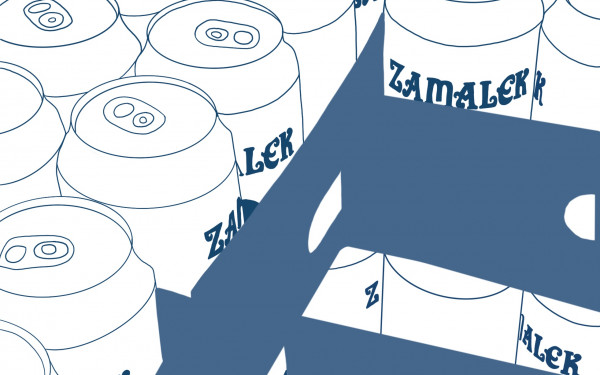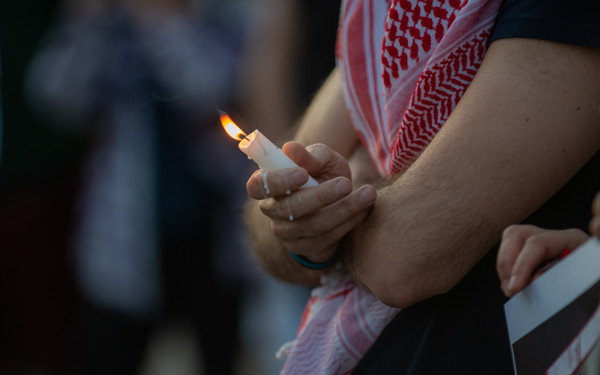From Bachelors to Battlezone
A Concordia Graduate Talks War Reporting
The horrible realities of Israel left a scarring impression on former Concordia student Jillian Kestler-D’Amours, who recounted her experience as a war correspondent for Al Jazeera last Tuesday.
Kestler-D’Amours saw the opportunity for an internship to Jerusalem during her last year of undergrad and went for it.
“I was jumping into the deep end by going on this trip, just hoping that things would work out,” she said. But a trip that was supposed to last six months ended up lasting almost four and half years, not without an effect on her mental health.
“It does definitely take a toll personally to be there for that long and to see really horrific things at the end of the day. It was psychologically draining,” Kestler-D’Amours said.
It didn’t help that part of her family saw her as a traitor for going to work in the Middle East.
“I got a lot of flak, especially going and talking about Palestinian rights was a big issue. My family and friends called me a lot of nasty things: self-hater, anti-Semite… I’m half-Jewish. So I’m like, ‘Alright, you’ve known me since I was born but if you think that I’m racist then that’s cool!’
“I’m really sensitive and had to develop thick skin.”
Kestler-D’Amours began her internship making videos for a local joint Israeli-Palestinian organization called the Alternative Information Centre. She then started freelancing, met other journalists and made connections with other publications. Three years later, she began working for Al Jazeera English in Qatar.
“I wanted to get the human story of these places that you don’t really hear [about] that much,” she said.
One story in particular affected the nascent war correspondent.
“About a thousand Israeli personnel came to destroy a village of 300 people, half of which were children. People couldn’t believe that this had happened at first,” she said of a demolished Bedouin village near Israel.
“Now that it’s the 70th demolition of the village over the span of 40 years, people have stopped reporting on it. That’s the one story that, even looking back, is still really difficult.
“It makes it harder because you’re a human at the end of the day as much as you’re a journalist,” she admitted.
When Kestler-D’Amours first came to the Middle East, she started writing in a blog to report on how the events impacted her emotionally. But she stopped writing within a month because if she continued she would have been “crying in a ball shaking back and forth.”
Her way of coping with what was happening around her was to continuously work and move on to the next story. That way, she focused her attention on what was happening instead of how it made her feel, she said.
But she couldn’t always escape the violence around her. She recalled being caught between the army and a crowd of rioters in a poor neighbourhood.
“I was there with my camera like, ‘this isn’t going to end well.’ I took cover, but it was a scary moment.”
On top of the risk of violence, working for Al Jazeera in Egypt could get her arrested.
“Regimes don’t like Al Jazeera because they’re afraid to be ousted from power,” she said.
“Especially as a freelancer where you’re not a staff reporter, you don’t have the full protection.”
Of her experience, Kestler-D’Amours has no regrets. “It’s made me really question everything and not see something and say that it’s ‘truth,’ because I don’t really think that exists, ever.”
“Coming back to Canada, I can see the parallels with the policies here and with what’s happening internationally […] everything is linked and that we should always challenge where the power centres lie.”
Although it’s a dangerous time to be a journalist in the Middle East, Kestler-D’Amours says that there are so many stories that need to be told. She advises journalists that want to go to the Middle East to do as much research on the area as they can in order to remain as safe as possible.
Now back in Canada, 27-year-old Kestler-D’Amours is going to work for The Toronto Star as a digital journalist.
“I’m excited to do local reporting where you can effect change,” she said.
“You can see the change happen sometimes a bit clearer [in local reporting] than you would reporting on these global issues that take years and years and decades to shift.”

_900_652_90.jpg)

_600_375_90_s_c1.jpg)
_1__600_375_90_s_c1.jpg)

